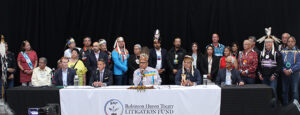Canada and Ontario to return $10 Billion to Robinson Huron Communities in proposed Settlement

By Catherine Murton Stoehr
ROBINSON HURON TERRITORY – The Robinson Huron First Nations have secured a conditional commitment from Ontario and Canada of $5 billion each to return past resource revenues, for a total of $10 billion.
Speaking on behalf of the Robinson Huron First Nations, Batchewana Chief Dean Sayers observed that the money was “compensation that should have been paid to our ancestors over the last 170 years.”
Chief Sayers and Duke Peltier, secretary-treasurer of the Robinson-Huron Treaty Litigation Fund, announced the potential agreement this past weekend sitting alongside Canada’s Minister of Crown-Indigenous Relations Marc Miller, and Minister of Indigenous Affairs of Ontario Greg Rickford. The deal must be approved by Canada, Ontario, and the Robinson Huron First Nations to be finalized.
Specifics were not shared as to how or when the money would be distributed, but a basic timeline can be sketched out:
- Community discussions of the proposed agreement will begin this summer (2023). Duke Peltier said that the format of those discussions can be flexible to ensure that community members feel comfortable sharing their honest thoughts. Harry LaForme, acting in the traditional, but long dormant, role of Mizhinawe will lead those discussions.
- Within six to eight months, LaForme will submit a report and recommendations to the Robinson Huron trustees based on the community discussions. The trustees will vote on the proposed settlement.
- Canada and Ontario did not commit to a specific or estimated date for when their internal discussions will be concluded.
- Should all three parties agree to and sign, Canada and Ontario would then transfer the money within 60 days.
- Once the agreement is signed, the details will be made public and the money will be given to the communities according to a “Compensation Disbursement Agreement”.
- Negotiations over increasing the annuity going forward may begin.
What is clear is that the agreement only concerns past underpayment of Robinson Huron annuities. Annuities paid each summer by a representative of the Crown to individual community members will continue unchanged for now. Canada and Ontario have stated that they agree that the $4 payment is too low, and it appears they have committed to negotiations about raising it once the current agreement is finalized. Referencing the extended timeline of the recent litigation, Minister Rickford jokingly said negotiations to raise the annuities going forward “will not take 173 years.”
The $10 billion is intended to mitigate the accumulated harm of underpayment to past generations. African Americans pushing for reparations have focussed on how the loss of intergenerational wealth has exponentially disadvantaged their communities, or as Minister Miller observed ,”underfunding is a functional driver of underdevelopment.” This underdevelopment has been keenly felt in Robinson Huron First Nations.
Duke Peltier said that the funds could be used to build game-changing social and health infrastructure. In addition to the $10 billion payment being intended to replace funds lost by people who have passed on, the Chiefs said that there will also be individual payouts from this agreement.
Regarding non-Indigenous Canadians’ possible reaction to the agreement, Minister Miller observed that “a lot of people care about reconciliation, but they want it for free, but reconciliation ain’t free.” To that point, Anishinabek Nation’s Director of Communications Marci Becking addressed Minister Rickford noting that to get to reconciliation, the truth needs to be taught and asked if there are plans to change the Ontario Curriculum with respect to Treaty Education. Minister Rickford said “our government remains committed to comprehensive relations in all areas where we can enhance that relationship” but said he would not speak to specific matters outside of the day’s business.
Remarks repeatedly returned to the importance of the Anishinabek ancestors’ accomplishment in securing the treaty. Chief Sayers shared that he “could not explain in words his gratitude to the ancestors and the Elders” noting that today’s leadership wanted to “move forward in a way reflective of our ancestors’ words and expectations” reflecting: “Newcomers have only been here for a blink of an eye and it’s not been the best of relationships, not the best experience. But the sun has always been shining behind the cloud. The sun has always risen every day and will continue to rise for us and the work we do today, and for all the generations in the future, that sun will be dependable. It will light and warm our day.”
At the time of treaty, Fort William Chief Peau de Chat demanded payment for “every pound of mineral that has been taken off our lands as well as for that which may hereafter be carried away.” His first demand has now been answered as well as it is ever likely to be. As to resource revenues that will “hereafter carried away,” that fight still lies ahead.

